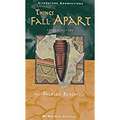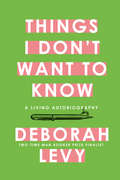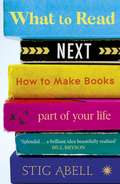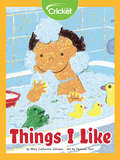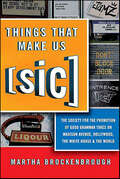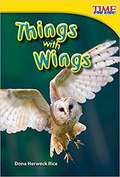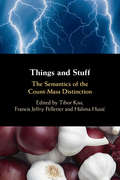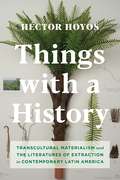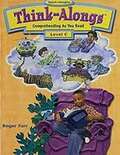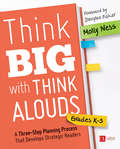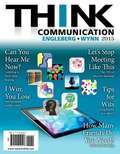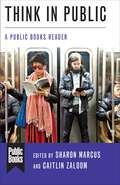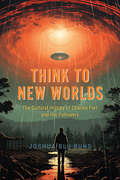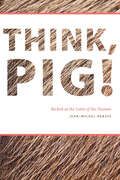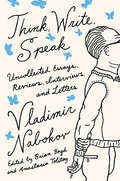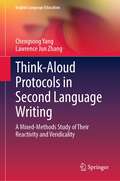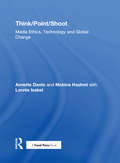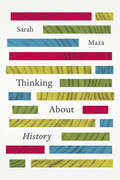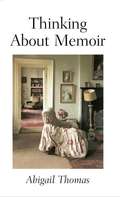- Table View
- List View
Things Fall Apart and Related Readings
by Chinua AchebeA book containing Things Fall Apart by Chinua Achebe and other great poems, stories and essays.
Things I Don't Want to Know: On Writing
by Deborah LevyA luminescent treatise on writing, love, and loss, a witty response to George Orwell's influential essay "Why I Write" Things I Don't Want to Know is the first in Deborah Levy's essential three-part "living autobiography" on writing and womanhood. Taking George Orwell's famous essay, "Why I Write", as a jumping-off point, Deborah Levy offers her own indispensable reflections of the writing life. With wit, clarity and calm brilliance, she considers how the writer must stake claim to that contested territory as a young woman and shape it to her need. Things I Don't Want to Know is a work of dazzling insight and deep psychological succour, from one of our most vital contemporary writers.
Things I Have to Tell You: Poems and Writing by Teenage Girls
by Betsy FrancoIn these poems and essays written by girls between the ages of 12 and 19, we share their experiences of living in a world plagued with violence, a drive to be thin, and an enduring hope that love will prevail.
Things I Learned on the 6.28: A Guide to Daily Reading
by Stig AbellFor a whole year on his train to work, Stig Abell read books from across genres and time periods. Then he wrote about them, and their impact on our culture and his own life.The result is a work of many things: a brisk guide to the canon of Western literature; an intimate engagement with writers from Shakespeare to JK Rowling, Marcel Proust to Zora Neale Hurston; a wise and funny celebration of the power of words; and a meditation on mental unrest and how to tackle it. It will help you discover new books to love, give you the confidence to give up on those that you don't, and remind you of ones that you already do.Things I Learned on the 6.28 has been written for the reader in all of us.
Things I Learned on the 6.28: A Guide to Daily Reading
by Stig AbellFor a whole year on his train to work, Stig Abell read books from across genres and time periods. Then he wrote about them, and their impact on our culture and his own life.The result is a work of many things: a brisk guide to the canon of Western literature; an intimate engagement with writers from Shakespeare to JK Rowling, Marcel Proust to Zora Neale Hurston; a wise and funny celebration of the power of words; and a meditation on mental unrest and how to tackle it. It will help you discover new books to love, give you the confidence to give up on those that you don't, and remind you of ones that you already do.Things I Learned on the 6.28 has been written for the reader in all of us.
Things I Like
by Mary Catherine JohnsonFrom bubbles in the bath, to teddy bears in bed—it's all the things I like!
Things I'll Never Say
by Cassandra NewbouldA beautifully raw coming-of-age story for fans of Becky Albertalli and Julie Murphy, examining what it means to crush on your two best friends at the same time.Ten years ago, the Scar Squad promised each other nothing would tear them apart. Even when Casey Jones Caruso lost her twin brother Sammy to an overdose, and their foursome became a threesome, the squad picked each other up. But when Casey&’s feeling for the remaining members—Francesca and Benjamin—develop into romantic attraction, she worries the truth will dissolve them.Casey tries to ignore her heart, until Ben kisses her at a summer party, and Frankie kisses another girl. Now Casey must confront all the complicated feelings she&’s buried—for her friends and for the brother she&’s totally pissed at for dying. Since Sammy&’s death, Casey has spilled all the things she can no longer say to him in journals, and now more than ever, she wishes he were here to help her decide whether she should guard her heart or bet it all on love, before someone else decides for her.
Things That Make Us [Sic]: The Society for the Promotion of Good Grammar Takes on Madison Avenue, Hollywood, the White House & the World
by Martha BrockenbroughThis book is for people who experience heartbreak over love notes with subject-verb disagreements...for anyone who's ever considered hanging up the phone on people who pepper their speech with such gems as "irregardless," "expresso," or "disorientated"...and for the earnest souls who wonder if it's "Woe is Me," or "Woe is I," or even "Woe am I." Martha Brockenbrough's Things That Make Us (Sic) is a laugh-out-loud guide to grammar and language, a snarkier American answer to Lynn Truss's runaway success, Eats, Shoots & Leaves. Brockenbrough is the founder of National Grammar Day and SPOGG -- the Society for the Promotion of Good Grammar -- and as serious as she is about proper usage, her voice is funny, irreverent, and never condescending. Things That Make Us (Sic) addresses common language stumbling stones such as evil twins, clichés, jargon, and flab, and offers all the spelling tips, hints, and rules that are fit to print. It's also hugely entertaining, with letters to high-profile language abusers, including David Hasselhoff, George W. Bush, and Canada's Maple Leafs [sic], as well as a letter to --and a reply from -- Her Majesty, the Queen of England. Brockenbrough has written a unique compendium combining letters, pop culture references, handy cheat sheets, rants, and historical references that is as helpful as it is hilarious.
Things With Wings (Time For Kids® Informational Text #Guided Reading Level F)
by Dona RiceEarly readers learn about wings, wing anatomy, and animal flight in this descriptive nonfiction reader that features informational text, vivid photos, and a glossary to support instruction.
Things and Stuff: The Semantics of the Count-Mass Distinction
by Francis Jeffry Pelletier Tibor Kiss Halima HusićA classical viewpoint claims that reality consists of both things and stuff, and that we need a way to discuss these aspects of reality. This is achieved by using +count terms to talk about things while using +mass terms to talk about stuff. Bringing together contributions from internationally-renowned experts across interrelated disciplines, this book explores the relationship between mass and count nouns in a number of syntactic environments, and across a range of languages. It both explains how languages differ in their methods for describing these two fundamental categories of reality, and shows the many ways that modern linguistics looks to describe them. It also explores how the notions of count and mass apply to 'abstract nouns', adding a new dimension to the countability discussion. With its pioneering approach to the fundamental questions surrounding mass-count distinction, this book will be essential reading for researchers in formal semantics and linguistic typology.
Things with a History: Transcultural Materialism and the Literatures of Extraction in Contemporary Latin America
by Héctor HoyosCan rubber trees, silicone dolls, corpses, soil, subatomic particles, designer shoes, and discarded computers become the protagonists of contemporary literature—and what does this tell us about the relationship between humans and objects? In Things with a History, Héctor Hoyos argues that the roles of objects in recent Latin American fiction offer a way to integrate materialisms old and new, transforming our understanding of how things shape social and political relations.Discussing contemporary authors including Roberto Bolaño, Ariel Magnus, César Aira, and Blanca Wiethüchter as well as classic writers such as Fernando Ortiz and José Eustasio Rivera, Hoyos considers how Latin American literature has cast things as repositories of history, with an emphasis on the radically transformed circulation of artifacts under globalization. He traces a tradition of thought, transcultural materialism, that draws from the capacity of literary language to defamiliarize our place within the tangible world. Hoyos contrasts new materialisms with historical-materialist approaches, exposing how recent tendencies sometimes sidestep concepts such as primitive accumulation, commodity fetishism, and conspicuous consumption, which have been central to Latin American history and literature. He contends that an integrative approach informed by both historical and new materialisms can balance seeing things as a means to reveal the true nature of social relations with appraisals of things in their autonomy. Things with a History simultaneously offers a sweeping account of the material turn in recent Latin American culture and reinvigorates social theory and cultural critique.
Think Alongs: Level E
by Roger Farr Jennifer Conner Elizabeth Haydel Bruce Tone Beth Greene Tanja Bisesi Cheryl GillilandThis book contains comprehensions focused on improving critical thinking for grade 1-6 students.
Think Big with Think Alouds: A Three-Step Planning Process That Develops Strategic Readers (Corwin Literacy)
by Molly K. NessI’m guessing that those two are planning a surprise. . . . The author keeps mentioning the storm because she wants us to think that the character’s upset. . . . Wait—yikes, I gotta go back and reread because I’m not getting this part. . . . These are the flickering thoughts of a strategic reader. If only we could bottle all these mental moves and pour them into the minds of our students, then readers’ achievement would grow exponentially. In Think Big With Think Alouds, Molly Ness delivers a process that comes close to bottling that magic. Molly spent a year researching teachers’ think alouds, and she uses these findings to help you know just what to do. The big time-saver? You focus on just these five strategies: asking questions, making inferences, synthesizing, understanding the author’s purpose, and monitoring and clarifying. Select the one or two strategies that align to your text, and get ready with a stack of sticky notes! Grab a pencil, and you are on your way to dynamic lessons using Molly’s three-step planning process: Read Once: Go wild, putting a flurry of sticky notes on spots that strike you Read Twice: Whittle your notes down to the juiciest stopping points Read Three Times: Jot down what you will say so there’s no need to wing it in front of the kids Other practical tools include More than 20 ready-made think aloud scripts for favorite texts by Sandra Cisneros, Seymour Simon, Shel Silverstein, and many others, to use for think alouds for fiction, informational text, and poetry. Fun small group and partner activities to gradually transfer comprehension strategies to your students. Downloads on the companion website, including spinner and dice templates, planning forms, and think aloud scripts Molly Ness is an associate professor at Fordham University’s Graduate School of Education. She graduated Phi Beta Kappa from Johns Hopkins University and earned her PhD in reading education from the University of Virginia. A former Teach For America corps member, she is an experienced classroom teacher and reading clinician. Her numerous books and articles focus on reading comprehension, the instructional decisions of teachers, and the assessment and diagnosis of struggling readers.
Think Big with Think Alouds: A Three-Step Planning Process That Develops Strategic Readers (Corwin Literacy)
by Molly K. NessI’m guessing that those two are planning a surprise. . . . The author keeps mentioning the storm because she wants us to think that the character’s upset. . . . Wait—yikes, I gotta go back and reread because I’m not getting this part. . . . These are the flickering thoughts of a strategic reader. If only we could bottle all these mental moves and pour them into the minds of our students, then readers’ achievement would grow exponentially. In Think Big With Think Alouds, Molly Ness delivers a process that comes close to bottling that magic. Molly spent a year researching teachers’ think alouds, and she uses these findings to help you know just what to do. The big time-saver? You focus on just these five strategies: asking questions, making inferences, synthesizing, understanding the author’s purpose, and monitoring and clarifying. Select the one or two strategies that align to your text, and get ready with a stack of sticky notes! Grab a pencil, and you are on your way to dynamic lessons using Molly’s three-step planning process: Read Once: Go wild, putting a flurry of sticky notes on spots that strike you Read Twice: Whittle your notes down to the juiciest stopping points Read Three Times: Jot down what you will say so there’s no need to wing it in front of the kids Other practical tools include More than 20 ready-made think aloud scripts for favorite texts by Sandra Cisneros, Seymour Simon, Shel Silverstein, and many others, to use for think alouds for fiction, informational text, and poetry. Fun small group and partner activities to gradually transfer comprehension strategies to your students. Downloads on the companion website, including spinner and dice templates, planning forms, and think aloud scripts Molly Ness is an associate professor at Fordham University’s Graduate School of Education. She graduated Phi Beta Kappa from Johns Hopkins University and earned her PhD in reading education from the University of Virginia. A former Teach For America corps member, she is an experienced classroom teacher and reading clinician. Her numerous books and articles focus on reading comprehension, the instructional decisions of teachers, and the assessment and diagnosis of struggling readers.
Think Communication (Third Edition)
by Isa N. Engleberg Dianna R. WynnUnderstand core communication concepts THINK Communication distills major communication concepts, theories, research, and trends into bite-size essentials, making learning human communication not only fun, but accessible and relatable. Students will find that THINK Communication's unique features help them to identify and understand their own communication behaviors, as well the communication behavior of others. MySearchLab is a part of the Engleberg program. Research and writing tools, including access to academic journals, help students understand critical thinking in even greater depth. To provide students with flexibility, students can download the eText to a tablet using the free Pearson eText app. Note: MySearchLab does not come automatically packaged with this text. To purchase MySearchLab, please visit: www. mysearchab. com or you can purchase a ValuePack of the text + MySearchLab (at no additional cost): ValuePack ISBN-10: 0205239927/ ValuePack ISBN-13: 9780205239924
Think in Public: A Public Books Reader (Public Books Series)
by Barbara Cassin Jill Lepore Judith Butler Kieran Setiya Fred Turner Jan Mieszkowski Jeremy Adelman Haruo Shirane Anne E. Fernald Matthew Engelke Imani Perry James Vernon Gayatri Chakravorty Spivak Kim Phillips-Fein Philip Gorski Frances Negrón-Muntaner Namwali Serpell Shannon Mattern Karen Dunak John Plotz Daegan Miller Christopher Schaberg Lilly Irani Joseph Jonghyun Jeon Suzy Hansen Max Holleran Mark McGurl Stacey Balkan Nathan Connolly Najwa Al-Qattan Destin Jenkins Andrew Perrin Lynn French Salamishah Tillet Matthew Clair Ursula K. Guin Eli Rosenblatt Rebecca Falkoff Karl Ashoka Britto Marah Gubar Tess McNulty Nicholas Dames John R. McNeillSince 2012, Public Books has championed a new kind of community for intellectual engagement, discussion, and action. An online magazine that unites the best of the university with the openness of the internet, Public Books is where new ideas are debuted, old facts revived, and dangerous illusions dismantled. Here, young scholars present fresh thinking to audiences outside the academy, accomplished authors weigh in on timely issues, and a wide range of readers encounter the most vital academic insights and explore what they mean for the world at large.Think in Public: A Public Books Reader presents a selection of inspiring essays that exemplify the magazine’s distinctive approach to public scholarship. Gathered here are Public Books contributions from today’s leading thinkers, including Jill Lepore, Imani Perry, Kim Phillips-Fein, Salamishah Tillet, Jeremy Adelman, N. D. B. Connolly, Namwali Serpell, and Ursula K. Le Guin. The result is a guide to the most exciting contemporary ideas about literature, politics, economics, history, race, capitalism, gender, technology, and climate change by writers and researchers pushing public debate about these topics in new directions. Think in Public is a lodestone for a rising generation of public scholars and a testament to the power of knowledge.
Think to New Worlds: The Cultural History of Charles Fort and His Followers
by Joshua Blu BuhsHow a writer who investigated scientific anomalies inspired a factious movement and made a lasting impact on American culture. Flying saucers. Bigfoot. Frogs raining from the sky. Such phenomena fascinated Charles Fort, the maverick writer who scanned newspapers, journals, and magazines for reports of bizarre occurrences: dogs that talked, vampires, strange visions in the sky, and paranormal activity. His books of anomalies advanced a philosophy that saw science as a small part of a larger system in which truth and falsehood continually transformed into one another. His work found a ragged following of skeptics who questioned not only science but the press, medicine, and politics. Though their worldviews varied, they shared compelling questions about genius, reality, and authority. At the center of this community was adman, writer, and enfant terrible Tiffany Thayer, who founded the Fortean Society and ran it for almost three decades, collecting and reporting on every manner of oddity and conspiracy. In Think to New Worlds, Joshua Blu Buhs argues that the Fortean effect on modern culture is deeper than you think. Fort’s descendants provided tools to expand the imagination, explore the social order, and demonstrate how power is exercised. Science fiction writers put these ideas to work as they sought to uncover the hidden structures undergirding reality. Avant-garde modernists—including the authors William Gaddis, Henry Miller, and Ezra Pound, as well as Surrealist visual artists—were inspired by Fort’s writing about metaphysical and historical forces. And in the years following World War II, flying saucer enthusiasts convinced of alien life raised questions about who controlled the universe. Buhs’s meticulous and entertaining book takes a respectful look at a cast of oddballs and eccentrics, plucking them from history’s margins and spotlighting their mark on American modernism. Think to New Worlds is a timely consideration of a group united not only by conspiracies and mistrust of science but by their place in an ever-expanding universe rich with unexplained occurrences and visionary possibilities.
Think, Pig!: Beckett at the Limit of the Human
by Jean-Michel RabatéThis book examines Samuel Beckett’s unique lesson in courage in the wake of humanism’s postwar crisis—the courage to go on living even after experiencing life as a series of catastrophes.Rabaté, a former president of the Samuel Beckett Society and a leading scholar of modernism, explores the whole range of Beckett’s plays, novels, and essays. He places Beckett in a vital philosophical conversation that runs from Bataille to Adorno, from Kant and Sade to Badiou. At the same time, he stresses Beckett’s inimitable sense of metaphysical comedy.Foregrounding Beckett’s decision to write in French, Rabaté inscribes him in a continental context marked by a “writing degree zero” while showing the prescience and ethical import of Beckett’s tendency to subvert the “human” through the theme of the animal. Beckett’s “declaration of inhuman rights,” he argues, offers the funniest mode of expression available to us today.
Think, Write, Speak: Uncollected Essays, Reviews, Interviews, and Letters to the Editor
by Vladimir NabokovA rich compilation of the previously uncollected Russian and English prose and interviews of one of the twentieth century's greatest writers, edited by Nabokov experts Brian Boyd and Anastasia Tolstoy"I think like a genius, I write like a distinguished author, and I speak like a child": so Nabokov famously, and infamously, wrote when introducing his 1973 volume of selected prose, Strong Opinions. Think, Write, Speak follows up where Strong Opinions left off, presenting Nabokov's public writings from a 1921 essay about Cambridge to two last interviews in 1977. The chronological order allows us to watch the Cambridge student and the fledgling Berlin reviewer and poet turn into the acclaimed Paris émigré novelist whose stature would bring him to teach and write in America, where his international success exploded with Lolita and propelled him back to Europe as a recognized literary master. Straddling Russian, French and Anglophone worlds, Nabokov discovers contemporary literature and culture at his own pace and with his own strong dispositions. Whether his subject is Proust or Pushkin, the sport of boxing or the privileges of democracy, Nabokov's supreme individuality and his alertness to the details of life past and present illuminate the page and remind us why he has been called the greatest of prose stylists.
Think-Aloud Protocols in Second Language Writing: A Mixed-Methods Study of Their Reactivity and Veridicality (English Language Education #34)
by Lawrence Jun Zhang Chengsong YangThis book addresses the validity of think-aloud protocols (TAPs) in L2 writing research through a mixed methods study and proposes effective approaches for their valid implementation. The book uncovers the reactive effects that TAPs have on L2 writing performance and processes, and examines how individual factors moderate this reactivity. It further presents and categorizes participants' perceptions regarding reactivity and veridicality. To enhance veridicality, the book identifies incomplete TAPs using retrospective verbal reports as a reference point. Recommendations for utilizing TAPs include considering participants' individual differences, recent experiences, and emotions. This book will be valuable to educators teaching methodology in second or foreign language education, applied linguistics, or writing research, and to L2 researchers or graduate students with a broad interest in research methods, process-based research, or writing studies, or planning to incorporate TAPs into their research.
Think/Point/Shoot: Media Ethics, Technology and Global Change
by Annette Danto Mobina Hashmi Lonnie IsabelThink/Point/Shoot gives students a thorough overview of the role of ethics in modern media creation. Case studies emphasize the critical issues in global media ethics today in all stages of media creation from preproduction research and development, to production and post production. This volume features practicing filmmakers, journalists, and media creators who provide insight into dealing with real-world ethical dilemmas. For this era, digital imagery, sounds, and web communication have opened doors to sharing thoughts and ideas instantaneously to potentially vast audiences. This presents exciting opportunities, but also serious ethical, legal, and social challenges. The cases and exercises found in this book are applicable to the current media field while still remaining grounded in strong ethical theory. Think/Point/Shoot explains the challenge of communicating a story to a worldwide audience while maintaining ethical standards. A companion website provides additional resources for students and instructors: media ethics game chapter summaries and case studies important forms Instructors will also find: classroom exercises PowerPoints video from the "Global Media Ethics" Conference from March 2013
Thinking About History
by Sarah MazaWhat distinguishes history as a discipline from other fields of study? That's the animating question of Sarah Maza’s Thinking About History, a general introduction to the field of history that revels in its eclecticism and highlights the inherent tensions and controversies that shape it. Designed for the classroom, Thinking About History is organized around big questions: Whose history do we write, and how does that affect what stories get told and how they are told? How did we come to view the nation as the inevitable context for history, and what happens when we move outside those boundaries? What is the relation among popular, academic, and public history, and how should we evaluate sources? What is the difference between description and interpretation, and how do we balance them? Maza provides choice examples in place of definitive answers, and the result is a book that will spark classroom discussion and offer students a view of history as a vibrant, ever-changing field of inquiry that is thoroughly relevant to our daily lives.
Thinking About Memoir
by Abigail ThomasIf living is an art, it must be practiced with diligence before being done with ease. Yet almost nothing in our culture prepares us for reflection on the great themes of existence: courage, friendship, listening, dignity--those everyday virtues that can transform our world. Because AARP believes it's never too late (or too early) to learn, they, together with Sterling Publishing, have created theAbout Livingseries to address these crucial issues. Each entry will be written by only the best authors and thinkers. Thinking About Memoir, the first of these volumes, helps adults look back at their past and use writing as a means of figuring out who they used to be and how they became who they are today. It's written by Abigail Thomas, whose own memoirA Three Dog Lifewas selected as one of the Best Books of 2006 by the LA Times and the Washington Post and called "perfectly honed" (Newsweek), "bracingly honest" (Vanity Fair), and "stunning" by theLos Angeles Book Review. Thomas writes that memoir can consist of looking back at a single summer or the span of a whole life. Through her experience as a writing teacher, she knows how difficult that can be; this book is about the habit of writing as a way to keep track of what's going on in the front and the back of your mind. It inspires different ways for us to look at the moment we're in right now and will help would-be memoirists find their own "side door" into a subject. Thomas writes eloquently about how to get started and find that jumping-off point for your work, and provides exercises that liberate our creativity, enable us to get the distance and perspective we need, and open our eyes to possibilities that may not at first seem obvious. Whether your words are for publication, for your loved ones, or for you alone, Thomas makes the process fulfilling, thoughtful, and even fun.
